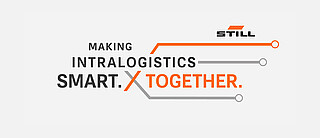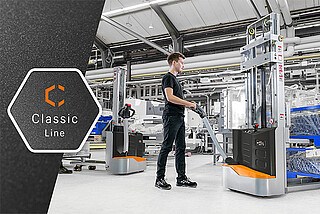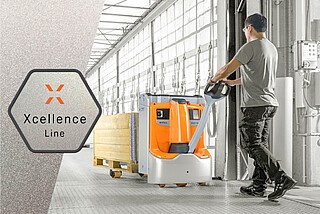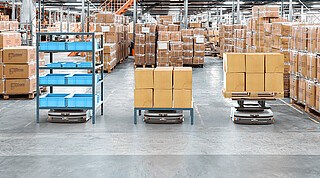How smart is the intralogistics industry of the future?
STILL is sharpening its brand profile - because customers need efficient solutions that fit their requirements. Therefore, STILL is focusing on the megatrends of the future. To meet the customers' needs one hundred per cent, the intralogistics provider defines its future orientation as “smart”. This stands for a whole bundle of forward-looking ideas.
Nothing is as constant as change. Intralogistics, however, has changed particularly dramatically over the past ten years, an impression shared even by long-standing industry insiders. "The ups and downs are getting faster," says Frank Müller, Senior Vice President STILL Brand Management. This is a challenge for customers - and therefore one to which STILL seeks to provide answers. "We have always been part of shaping the change," Müller emphasises, "it is one of the secrets of STILL's success to have answers to changing requirements."

"Making Intralogistics Smart. Together." This is the headline that STILL wants to use to define its brand in the future. "Smart" is a surprisingly complex and multifaceted word - its range of meaning even includes a fashionably elegant style of dress. Here it is of course about the other dimension of meaning of "smart": depending on the situation, it can mean bright, clever people or tricky, ingenious ideas. Key for Frank Müller is above all the aspect of being imaginative - but within this framework also the idea of "Suitable and efficient: that's smart!" For STILL, the focus is on ideas that have a meaningful and tangible effect for the customer. Müller sees a decisive new approach here and calls for a new way of thinking: for a long time, the motto was "higher, faster, further": Every new feature, every technical addition was interpreted as a sign of higher quality. For various reasons, this no longer applies unconditionally; sustainability is now more central than ever before. Moreover, the world has experienced in recent years the devastating effects of disruptions: interrupted supply chains, lack of raw materials, shortages of energy or labour. "Suddenly, parts are not available because a supertanker is stuck in the Suez Canal," Müller recalls of the incident in the spring of 2021. "Nowadays, customers have to react quickly and flexibly."
Efficient is better than overly complex
And that means: in such cases, simple, straightforward solutions can be the "smarter" answer than overly complex systems. "Not everything that is possible always makes sense," emphasises Müller. It depends on the situation. There is no universal answer to multi-layered challenges. Instead, the result must fit the customer's requirements. And this is where the aspect of teamwork, the "together", comes into play. STILL's paramount goal is to respond flexibly to customer requirements. Scaling is an important issue here: customers may want to start with a simple truck that is available quickly, but definitely want to be able to respond to changing requirements. "They don't want to compromise on quality, safety or service," says Müller.


These considerations are the basis for STILL's decision to offer two product lines in future, each of which will be precisely fitted to customer requirements: The 'Xcellence Line' offers advanced technology, can be customised to a high degree and is the solution for demanding applications. The ‘Classic Line’, on the other hand, offers entry-level solutions: It is standardised, quickly available and reasonably priced. It will gradually be expanded into a complete portfolio. "The Classic Line is the answer to simple, basic applications and thus also allows us to move into new target groups and markets," Müller explains.
A smart response to megatrends
E-commerce is undoubtedly one of the megatrends of the past decade: one of those phenomena that seem almost commonplace to us but have actually been incredibly disruptive within a comparatively short period of time - and whose development is not yet complete. The STILL brand is also “smart” because it provides a multi-layered response to several of these megatrends and their effects.
Internationalisation and globalisation, for example, are the drivers of exactly those processes that mean that unexpected disruptions in one part of the world suddenly have an impact on other, far-off regions. In addition, there is a new kind of competition: "Our customers have been exposed to much stronger competitive pressure over the past five to ten years," says Müller. They are literally competing with the entire world. "They have to be more efficient, produce at lower unit costs," he adds, "and for that they need efficient and lean logistics solutions, in other words: smart solutions!" STILL is their partner in this.

Automation: Straightforward and simple
Automation is another of these trends that has developed momentum. In a survey, more than half of STILL's customers said they wanted to replace manual processes with automation within the next three years - so from a producer's point of view: without delay. "Ideally, customers want their automation to be straightforward and simple," explains Müller. The challenge: not everyone has the luxury of designing a new warehouse with automated solutions in mind from the outset - on the contrary. Especially in Europe, automation has to be fitted into existing structures, i.e. into already existing warehouses and their infrastructure. A so-called "brownfield" situation, as opposed to the proverbial "greenfield", where planning can be done freely. Another example of why solutions that have the customer's requirements and constraints in mind will be so crucial in the future - and why it is important to act "together" in the process, i.e. to take the customer's point of view.

Warehouses where employees are present require completely different automation ideas than those where entire areas can be closed off. One thing is clear, however: the shortage of skilled workers, which affects intralogistics to an even greater extent than many other industries, will continue to fuel automation. And STILL as a brand is self-confident enough to be able to stand out here with customised solutions. These include autonomous or semi-autonomous vehicles that can make their own decisions - and are not dependent on all conditions in the warehouse being precisely tailored to their automation routines. This offers advantages on several levels. In particular, because such solutions are easy to implement and can subsequently be scaled in a targeted manner. An ideal answer to brownfield situations
Sustainability as an opportunity
Finally, there is the topic of sustainability. "A matter close to STILL's heart," says Müller, and points out that the “Mission Zero Emission” was launched back in 2015: "We've been working on this for eight years." And this head start in experience pays off for a brand orientation that is geared to the future. For example, if you really want to set an example of circularity, it must be part of the concept right from the start when developing products. STILL has already started corresponding projects: "The idea of using materials again and again, cradle to cradle, i.e. from origin to origin, was initially laughed at," Müller recalls. "Today, no one laughs about it anymore - the urgent need is clear to everyone." The shift to circularity is perhaps one of the largest waves of transformation for the economy and society, says Müller: "And we see it as an opportunity." For the next RXE electric truck, there is already a concept study to plan it circularly from design to production to use at the customers' site. The CO2 savings calculated in the study are extremely promising.

A number of other topics arise in this context: intelligent energy management for power units, for example. "Especially nowadays, you have to be careful not to create unnecessary energy peaks," Müller knows. Smart chargers can help to control charging processes intelligently. STILL wants to achieve the highest possible energy savings for customers - and at the same time guarantee that the trucks are fully available. It also goes with this that STILL has been involved with fuel cell technology for almost 20 years. "We are convinced of the benefits of hydrogen," affirms Müller. STILL is launching its own 24 V fuel cell this autumn so that customers can obtain the power unit, service and industrial truck from a single source.
Into the future together
"Making Intralogistics Smart. Together." This is STILL's motto - and every word of it is meaningful. Because for STILL it is clear that “smart” only works “together”; the term “together” is, in a sense, the quintessence of “smart”: best-fit and efficient solutions for every customer. Frank Müller is certain: "Solutions like this are exactly what our markets need. STILL will remain the reliable partner of the future."
Contact request
Subscribe to the Newsletter !
Always up to date with STILL: Subscribe to the STILL newsletter and we will inform you regularly about interesting industry topics.
